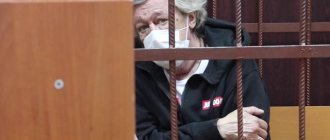Article 2 of the Criminal Code of the Russian Federation.
1. The objectives of this Code are: protection of human and civil rights and freedoms, property, public order and public safety, the environment, the constitutional system of the Russian Federation from criminal attacks, ensuring peace and security of mankind, as well as crime prevention.
2. To carry out these tasks, this Code establishes the basis and principles of criminal liability, determines what acts dangerous to the individual, society or the state are recognized as crimes, and establishes types of punishments and other measures of a criminal legal nature for committing crimes.
Commentary to Art. 2 of the Criminal Code
1. Criminal law is designed to protect public relations from socially dangerous attacks. In accordance with the Constitution of the Russian Federation in Part 1 of Art. 2 of the Criminal Code of Russia establishes a hierarchy of values placed under criminal legal protection. This sequence was also observed when constructing the Special Part of the Criminal Code.
2. Criminal law is designed to prevent crimes. Private prevention serves to prevent violations of criminal law prohibitions by persons who have already committed crimes. Private prevention is achieved by imposing criminal penalties or other measures of a criminal legal nature on such persons.
General prevention serves to prevent violations of criminal law prohibitions by other citizens. General prevention is achieved by establishing in the criminal law not only prohibition norms, but also enabling norms (for example, on exemption from criminal liability in the case of positive behavior of the perpetrator after criminal behavior). General warning is carried out from the moment the law is published.
Article 2. Objectives of the Criminal Code of the Russian Federation
Appeal ruling of the Judicial Collegium for Criminal Cases of the Supreme Court of the Russian Federation dated May 29, 2018 N 35-APU18-5 against the decision of the Deputy Prosecutor General of the Russian Federation Gutsan A.V. dated October 25, 2016 on his extradition to law enforcement agencies of the Republic of Uzbekistan for prosecution under Part 1 of Art. 244- of the Criminal Code of the Republic of Uzbekistan, was left without satisfaction. After hearing the report of Judge Istomina G.N., the speech of Dalabaev Sh.A. and lawyer T.V. Shirokov, who supported the arguments of the prosecutor of complaints, the speech of prosecutor K.I. Koval, who believed that the court ruling should be left unchanged, Judicial Collegium
Determination of the Constitutional Court of the Russian Federation dated March 28, 2017 N 558-O
According to the article of the Criminal Code of the Russian Federation, the basis for the parole of a person serving a sentence, in particular, is the recognition by the court that for his correction he does not need to fully serve the sentence imposed by the court, as well as compensation for damage (in whole or in part) caused by the crime in the amount determined by a court decision. Consequently, during the remaining unserved part of the sentence, the convicted person must prove his correction by his behavior, which is the condition for his release. The fact that a crime was committed during this period refutes the correction of the parolee and provides grounds for imposing a punishment based on the aggregate of sentences, in which the unserved part of the punishment under the previous court sentence is partially or fully added to the punishment imposed by the last court sentence. Otherwise, it would be contrary to the objectives of the criminal law, the principles of guilt and justice (Articles , and of the Criminal Code of the Russian Federation) (Determination of the Constitutional Court of the Russian Federation of May 28, 2013 N 793-O). Accordingly, the period for expunging a criminal record in this case is calculated from the moment of serving the sentence imposed by the totality of sentences (Determination of the Constitutional Court of the Russian Federation of September 29, 2015 N 2286-O).
Determination of the Constitutional Court of the Russian Federation dated November 23, 2017 N 2779-O
1. In his complaint to the Constitutional Court of the Russian Federation, citizen K.V. Sonin, who is serving a criminal sentence in the form of imprisonment, asks to be declared inconsistent with the preamble of the Constitution of the Russian Federation and its articles 1, 2, 15, 17, 18, 19, 20, 23, 24, 25, 26, 45, 46, 48, 49 , 50, 52, 54, 68, 120, 123 and 126 Federal Law of July 3, 2016 N 324-FZ “On Amendments to the Criminal Code of the Russian Federation and the Criminal Procedure Code of the Russian Federation”, Article 14 of the Federal Law of August 20 2004 N 119-FZ “On state protection of victims, witnesses and other participants in criminal proceedings”, Federal Law of June 1, 2005 N 53-FZ “On the state language of the Russian Federation”, Articles 10 and 16.1 of the Federal Law of April 3, 1995 N 40-FZ “On the Federal Security Service”, articles 2, 5, 6, 8, 9, 11 and 15 of the Federal Law of August 12, 1995 N 144-FZ “On operational investigative activities”, articles , , , , , , , , , 290, 291, 303 and 307 of the Criminal Code of the Russian Federation, chapters 9, 11, 13, 19, 20, 39, 45.1, 47.1 and articles 1, 5, 7, 11, 14, 15, 16, 17, 18 , 21, 29, 40, 47, 56, 60, 61, 62, 73, 74, 75, 83, 87, 88, 89, 140, 144, 145, 159, 165, 171, 182, 183, 220, 252 , 259, 260, 283, 299, 302, 307, 313, 389.34, 397 and 399 of the Code of Criminal Procedure of the Russian Federation.
Decision of the Supreme Court of the Russian Federation dated November 23, 2017 in case No. AKPI17-898
March 4, 2011 Litvinov S.Yu. charged with committing crimes under Part 4 of Art. 159 and part 1 and art. 210 of the Criminal Code of the Russian Federation, on March 9 of the same year he was interrogated as an accused and a preventive measure was chosen for him in the form of a written undertaking not to leave the place and proper behavior.
Appeal ruling of the Judicial Collegium for Military Personnel Cases of the Supreme Court of the Russian Federation dated December 23, 2019 N 222-APU19-5
The testimony of Davranov himself, examined in court, witnesses Kh., T., K.A., specialist D. and other evidence underlying the verdict, including copies of procedural documents issued by the investigator of the Investigation Department at the Internal Affairs Directorate ... region of the Republic of Uzbekistan on the initiation of against citizens M. and I. of criminal cases under paragraph “b” of Part 2 of Art. 223 of the Criminal Code of the Republic of Uzbekistan (illegal travel abroad committed by a group of persons by prior conspiracy), Part 1 of Art. 244- Criminal Code of the Republic of Uzbekistan (creation, leadership, participation in religious extremist, separatist, fundamentalist or other prohibited organizations), Part 12 of Art. 154 of the Criminal Code of the Republic of Uzbekistan (mercenarism), and in relation to M., in addition, under paragraph “g” of Part 3 of Art. 244- of the Criminal Code of the Republic of Uzbekistan (production, storage, distribution or display of materials containing a threat to public safety and public order, committed using the worldwide information network “Internet”), confirm Davranov’s awareness of M. and I.’s involvement in the activities of a terrorist organization.
Determination of the Constitutional Court of the Russian Federation dated March 26, 2020 N 790-O
The fact of committing a crime before the expiration of the probationary period refutes the statement about the correction of the conditionally convicted person and provides grounds for imposing punishment based on the totality of sentences. Otherwise, it would be contrary to the objectives of the criminal law, principles of guilt and justice enshrined in the articles and the Criminal Code of the Russian Federation. Accordingly, this Code establishes that when imposing a punishment based on a cumulative sentence, the unserved part of the punishment under the previous court sentence is partially or fully added to the punishment imposed according to the last court sentence (part one of Article 70); If a conditionally convicted person commits an intentional grave or especially grave crime during the probationary period, the court revokes the conditional sentence and imposes a punishment on him according to the rules provided for in Article 70 of this Code (part five of Article 74). The above norms are based on the constitutional principles of fairness and proportionality of responsibility to the values protected by legislation and imply differentiation of public and legal responsibility, taking into account the punishment that was previously imposed by a court verdict, but was not executed at the time of the commission of a new crime. Such a revocation of a suspended sentence and the imposition of punishment based on the totality of sentences are based on the establishment in the court verdict of the fact of the commission of a new grave or especially grave crime during the probationary period (rulings of the Constitutional Court of the Russian Federation dated February 16, 2012 N 370-О-О, dated April 23, 2013 year N 572-O, dated July 16, 2013 N 1129-O, dated February 20, 2014 N 352-O, dated September 29, 2015 N 2077-O and dated February 28, 2022 N 545-O).
Determination of the Judicial Collegium for Criminal Cases of the Supreme Court of the Russian Federation dated August 29, 2018 N 18-UD18-63
In the cassation appeal, the convicted Didenko V.S. challenges the legality of the decision of the Presidium of the Krasnodar Regional Court dated February 28, 2022, asks to cancel it, review the decision of the Ust-Labinsky District Court of the Krasnodar Territory dated November 9, 2004 and in accordance with Art. The Criminal Code of the Russian Federation is to amend the verdicts of the Belorechensky District Court of the Krasnodar Territory dated July 26, 2000 and the Krasnodar Regional Court dated January 23, 2003. According to the verdict of July 26, 2000, the convict asks to reclassify his actions under paragraph “a” of Part 2 of Art. 166, paragraph “a” of Art. 158 of the Criminal Code of the Russian Federation as amended by Federal Law No. 26-FZ of March 7, 2011, which, in his opinion, improves his situation and mitigates the punishment using Art. of the Criminal Code of the Russian Federation, and according to the verdict of January 23, 2003 - to exclude the court’s indication of the presence in his actions of a particularly dangerous recidivism of crimes and to mitigate the punishment imposed on him under clauses “b”, “d” of Part 2 of Art. 131 of the Criminal Code of the Russian Federation and paragraphs “g”, “k”, part 2 of Art. 105 of the Criminal Code of the Russian Federation, as well as on the totality of these crimes on the basis of Part 3 of Art. of the Criminal Code of the Russian Federation and the totality of sentences in accordance with Art. Criminal Code of the Russian Federation.
Appeal ruling of the Judicial Collegium for Military Personnel Cases of the Supreme Court of the Russian Federation dated May 20, 2020 N 222-APU20-1SP
lawyer Sagadiev I.E., that in issue No. 61 the court illegally combined four acts provided for in Parts 1 and 2 of Art. 209 and part 1 and part 2 of Art. 210 of the Criminal Code of the Russian Federation, which do not form an ideal totality, which resulted in difficulties for the jury in understanding and comprehending these issues;
Determination of the Constitutional Court of the Russian Federation dated July 23, 2020 N 1902-O
Within the meaning of Article 54 of the Constitution of the Russian Federation, which specifies the generally recognized legal principle of NULLum crimen, NULLa poena sine lege (no crime, no punishment unless specified in the law), in conjunction with the provisions of part two of article and article of the Criminal Code of the Russian Federation, parts one and two Article 1, Articles 24, 27 and 73 of the Code of Criminal Procedure of the Russian Federation, the norms of criminal law serve as a substantive prerequisite for criminal procedural activity: suspicion or accusation of committing a crime must be based only on the provisions of the criminal law defining the criminality of the act, its punishability and other criminal - legal consequences, which establishes all the elements of a crime, the presence of which in the act, being the only basis for criminal liability, is subject to establishment only in the proper procedural order, mandatory for the court, prosecutor, head of the investigative body, investigator, interrogator and other participants in criminal proceedings (decrees of the Constitutional Court of the Russian Federation dated July 14, 2011 No. 16-P, dated November 19, 2013 No. 24-P, etc.).
Determination of the Constitutional Court of the Russian Federation dated July 23, 2020 N 1887-O
Within the meaning of Article 54 of the Constitution of the Russian Federation, which specifies the generally recognized legal principle of NULLum crimen, NULLa poena sine lege (no crime, no punishment unless specified in the law), in conjunction with the provisions of part two of article and article of the Criminal Code of the Russian Federation, parts one and two Article 1, Articles 24, 27 and 73 of the Code of Criminal Procedure of the Russian Federation, the norms of criminal law serve as a substantive prerequisite for criminal procedural activity: suspicion or accusation of committing a crime must be based only on the provisions of the criminal law defining the criminality of the act, its punishability and other criminal - legal consequences, which establishes all the elements of a crime, the presence of which in the act, being the only basis for criminal liability, is subject to establishment only in the proper procedural order, mandatory for the court, prosecutor, head of the investigative body, investigator, interrogator and other participants in criminal proceedings (decrees of the Constitutional Courts of the Russian Federation dated July 14, 2011 No. 16-P and November 19, 2013 No. 24-P).
Appeal ruling of the Judicial Collegium for Criminal Cases of the Supreme Court of the Russian Federation dated July 19, 2017 N 41-APU17-19
In paragraph 1 of the Resolution of the Plenum of the Supreme Court of the Russian Federation dated December 22, 2015 “On the practice of imposing criminal punishment by the courts of the Russian Federation,” the attention of the courts is drawn to the need to comply with the requirements of the law on a strictly individual approach to sentencing, bearing in mind that fair punishment contributes to solving problems and achieving the goals specified in the articles and the Criminal Code of the Russian Federation.
Second commentary to Art. 2 of the Criminal Code of the Russian Federation
1. From the wording of the commented article it is clear that the protective function of criminal law is put in first place, which is its main task, for the sake of which it exists.
2. The Criminal Code, defining the tasks of criminal legislation, established the priorities of criminal legal protection. The hierarchy of values protected by criminal law is as follows: individual - society - state. Priority protection of the individual comes from the Constitution of the Russian Federation and corresponds to the traditions existing in developed democratic states. At the legislative level, such a task as ensuring the peace and security of mankind is formulated. Among the tasks of criminal legislation, crime prevention has been highlighted for the first time, although it is obvious that such a task has always been there. This task reflects the preventive function of criminal law. Criminal law has an educational function.
3. The implementation of the assigned tasks is achieved by specific means provided for in Part 2 of Art. 2. The criminal law establishes the grounds and principles of criminal liability, determines what dangerous acts are considered criminal, and establishes types of punishments and other measures of a criminal legal nature.
The protective task of criminal law
The protective task, traditional for criminal legislation, in the Criminal Code of the Russian Federation is formulated on the basis of prioritization of criminal legal protection.
The list of objects of criminal legal protection reflects the hierarchy of values (person - society - state), which is a logical consequence of what is enshrined in Art. 2 of the Constitution of the Russian Federation the priority of universal human values. This priority also serves as the basis for the structure of the Special Part of the Criminal Code of the Russian Federation, but it does not follow from it that any of the objects is subject to more or less protection compared to others.
The objects of such protection are:
- the rights and freedoms of every person and citizen, which are the highest value, inalienable and belonging to everyone from birth (Articles 17 - 56 of the Constitution of the Russian Federation);
- property (according to Article 8 of the Constitution of the Russian Federation, private, state, municipal and other forms of property are equally recognized and protected);
- public order, which is understood as a set of social relations that ensure: public peace, observance of public morality, uninterrupted operation of transport, enterprises, institutions and organizations;
- physical and moral integrity of the individual; public security as a state of protection of vital interests of society from internal and external threats;
- environment (Article 42 of the Constitution of the Russian Federation, Federal Law of January 10, 2002 N 7-FZ “On Environmental Protection”);
- the constitutional system of the Russian Federation, the content of which includes the definition of the form of state power in the Russian Federation and its source, methods of its implementation, division into legislative, executive and judicial, the limits of the sovereignty of the Russian Federation, the principles of the federal structure, etc. (Chapter 1 of the Constitution of the Russian Federation);
- peace and security of mankind (Section XII “Crimes against the peace and security of mankind” of the Criminal Code of the Russian Federation).
The means of solving the protective task of criminal law are:
- determination of the basis of criminal liability, which is clearly stated in Art. 8 of the Criminal Code of the Russian Federation, according to which the only basis for criminal liability is the commission of an act containing all the elements of a crime provided for by the Criminal Code of the Russian Federation;
- defining the principles of criminal liability;
- criminalization of acts, i.e. fixing them in the law as criminal and criminally punishable, which is the result of the process of identifying socially dangerous forms of behavior, studying its causes, signs and consequences, determining the admissibility, possibility and expediency of combating it by criminal legal means;
- penalization of acts, i.e. establishing sanctions and limits of punishment for a particular crime;
- establishing certain criminal legal consequences of committing crimes.
Lawyer under Art. 354.1 of the Criminal Code of the Russian Federation Rehabilitation of Nazism
Lawyer under Art. 354.1 of the Criminal Code of the Russian Federation will study all the nuances of the case, conduct a conversation with the client and, together with him, determine the defense position. Before an experienced lawyer whom you trust enters the case, it is better to refrain from giving evidence altogether and refer to Art. 51 of the Constitution of the Russian Federation. If they come to your house with a search, do not open it right away, make sure that there is an appropriate sanction, the operational workers will not immediately break down the door on their own, unless they abandon the idea of a search and leave completely, then if they have serious intentions of opening the door, they will call the Ministry of Emergency Situations, it is time that plays in your favor. The main thing is to remain calm and self-controlled, take for granted the screams and knocks on the door of police officers and use the time to correctly navigate the situation. During interviews or any actions by law enforcement officers, do not explain anything and try to have as little contact as possible. As soon as you have the opportunity to contact a lawyer, take advantage of it. To call a lawyer, dial the phone number listed on the website.






